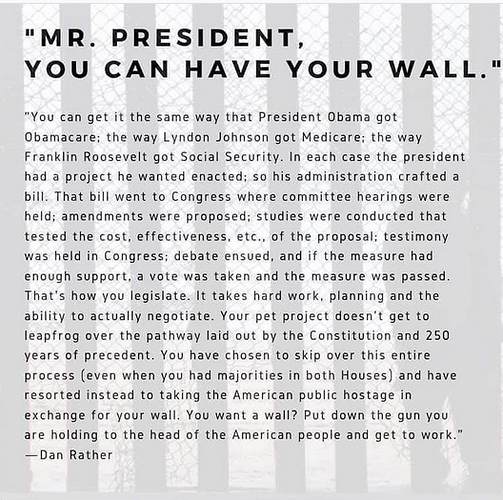So far, this is the longest shutdown in US history, and looks like these workers can not strike due the Taft-Hartley Act. Many are wondering if the TSA workers did not show up to work, and disable the airports from not running in a safe way, then wouldn’t that get people’s attention. Looks like the TSA workers are staying at work though…adhering to perhaps an allegiance to their group.
Clearly the stalemate has not end in sight…unless there were cataclysmic events from a host of problems that result from this slipshod arrangement.
Madness.
- What about all the federal employees and contractors who aren’t getting paid? What are their rights?
As of this past Friday, roughly 800,000 federal employees have missed their first paycheck. About 380,000 employees have been furloughed and another 420,000 are currently working without pay. Congress has already passed a bill that guarantees all federal employees back pay once the shutdown is over, but that does little to help them while it drags into its fourth week.
Javier Zarracina/Vox
What’s more, thousands of federal contractors are potentially affected by the shutdown as well. As many as 500,000 contractors are affiliated with the agencies that are caught up in the shutdown, according to NYU professor Paul Light. Many of these contractors won’t receive any back pay at all, while others might not see any impact on their paychecks, depending on how their employers have negotiated their contracts.
Interestingly, federal employees can’t use strikes to protest the current situation. Because of the Taft-Hartley Act, which was passed in 1947, it is actually illegal for federal employees to strike, and many unions have urged their members to refrain from doing so. As Quartz points out, the impetus for the law was to deter federal employees from disrupting key government services by striking to attain better wages. It probably didn’t consider that workers would strike because they weren’t being paid for their services at all, the Atlantic notes.
Workers who don’t go into the office because they are participating in a strike could be considered “absent without leave,” the American Federation of Government Employees’ policy director Jacque Simon told the Atlantic. As a result, they could face penalties at work including, potentially, losing their jobs.
They do have some recourse, however.
The American Federation of Government Employees has filed a class-action lawsuit against the Trump administration, noting that it’s illegal to keep workers on the job without compensation. It won a similar challenge after the shutdown in 2013, ultimately guaranteeing workers who participated in the suit twice the back pay they were owed.
- How many times has the government shut down in the past?
The government has shut down 21 times since 1976, the same year the modern budgeting process for the federal government went into effect. Since then, only one president — George W. Bush — has made it all the way through his term with no shutdowns.
…
- Do other developed countries have government shutdowns?
Government shutdowns are uniquely American. When the government shuts down in the US, the people who often feel the pain are government workers going without paychecks or those who depend on affected federal programs like food stamps. In other developed countries like Australia, politicians are the ones who feel the brunt of a shutdown. For instance, the Australian parliament risks being dissolved if government isn’t funded, which, in theory, makes it less likely to happen.
“We cannot find another democracy that shuts itself down,” House Majority Leader Steny Hoyer told reporters this week. Referencing parliament dissolving itself in Australia, Hoyer quipped that it “would not be a bad alternative.”
Other developed nations also have a lower threshold for passing budgets — a budget typically needs a simple majority rather than the higher percentage required in the US Senate. Simple majorities help prevent this kind of gridlock, but they could also carry the risks of making budgets more partisan documents, since you need fewer people to pass them.
“We are hearing from our workforce that many of them are calling out not because they are sick but because they are unable to make it to work for financial reasons,” Bilello said.
The agency hasn’t compiled the specific reasons, but officials assume it’s because of such things as transportation and childcare costs, he said. There are no plans to discipline employees who cite such financial issues.
The more than 51,000 airport security officers make an average of about $41,000 a year, according to federal data from May 2017.
https://www.bloomberg.com/news/articles/2019-01-16/unpaid-tsa-screeners-citing-financial-hardship-for-missing-work
And a call to action…


